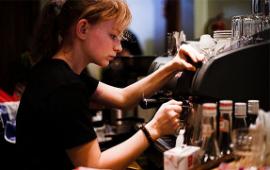Women's pay lags behind men's in tourism and hospitality

In Summary
- Swinburne research finds that women are paid less than their male counterparts in the tourism and hospitality sectors
- Women are earning 8.5 per cent less in tourism, and 7.5 per cent less in hospitality
- Findings indicate that Australia is falling behind in wage equality rankings
Women are earning significantly less than their male counterparts in the tourism and hospitality sector, according to Swinburne research.
Associate Professor in Marketing at Swinburne, Dr Simon Pervan, conducted a study of over 1400 women and 950 men to determine the gender wage gap in both the tourism and hospitality industries.
The study took into account factors such as education, years worked, marital status, number of children and place of birth.
The study found that in the tourism sector women are earning 8.5 per cent less than males, while in the hospitality sector women are earning 7.5 per cent less.
Dr Pervan says he is not surprised by the findings and believes the research is crucial to bring about change.
It’s real and it needs to be addressed.” - Dr Simon Pervan
“This confirms many previous international studies, some of which even show much higher discrepancies,” he says.
“It’s real and it needs to be addressed.”
Dr Pervan says the aim of the study was to determine whether Australia rivalled other countries when it came to the gender wage gap, particularly in the tourism sector.
“There was a curiosity to see whether Australia mirrored other countries in terms of wage discrepancies attributed to gender,” he says.
“We chose the tourism sector because it plays an important role in driving economic growth and the creation of employment opportunities for women.
“This is particularly important in the case of Australia, where tourism is largely a female-dominated industry.”
According to Tourism Research Australia, the Australian tourism industry contributed $53 billion to gross domestic product (GDP) in 2016 and employs over 580,000 people.
How Australia ranks in wage equality
Sessional lecturer in Leadership at Swinburne and former CEO of the Australian Women Chamber of Commerce & Industry, Yolanda Vega, says she is not shocked by these findings.
“I am not surprised, as the gender pay gap is not isolated to one industry alone,” says Ms Vega.
“It appears that irrespective of the quantity of females in any industry, the pay gap persists.”
In a Global Gender Gap Report by the World Economic Forum released earlier this month, it was revealed that despite being ranked in first place for educational attainment among women, Australia is ranked 42nd when it comes to wage equality.
“The overall consensus has been that if women obtain an education, the flow on effect would be equal opportunity,” explains Ms Vega.
“Unfortunately this has not been the case.”
Ms Vega believes that Dr Pervan’s research is an important step in fighting the issue of wage equality.
“It is important to have the data, in order to highlight the issues in a domestic context,” she says.
“Without the data we cannot address the discrepancies, nor provoke change to eliminate the sex discrimination that continues against women in the workplace.
“The facts tell the story; with this new data we can begin to tackle the inconsistencies that discriminate against women.”
The full findings of Dr Pervan’s research, The gender wage gap in the tourism industry: Evidence from Australia, will be published by Cognizant Communication Corporation in 2018.

